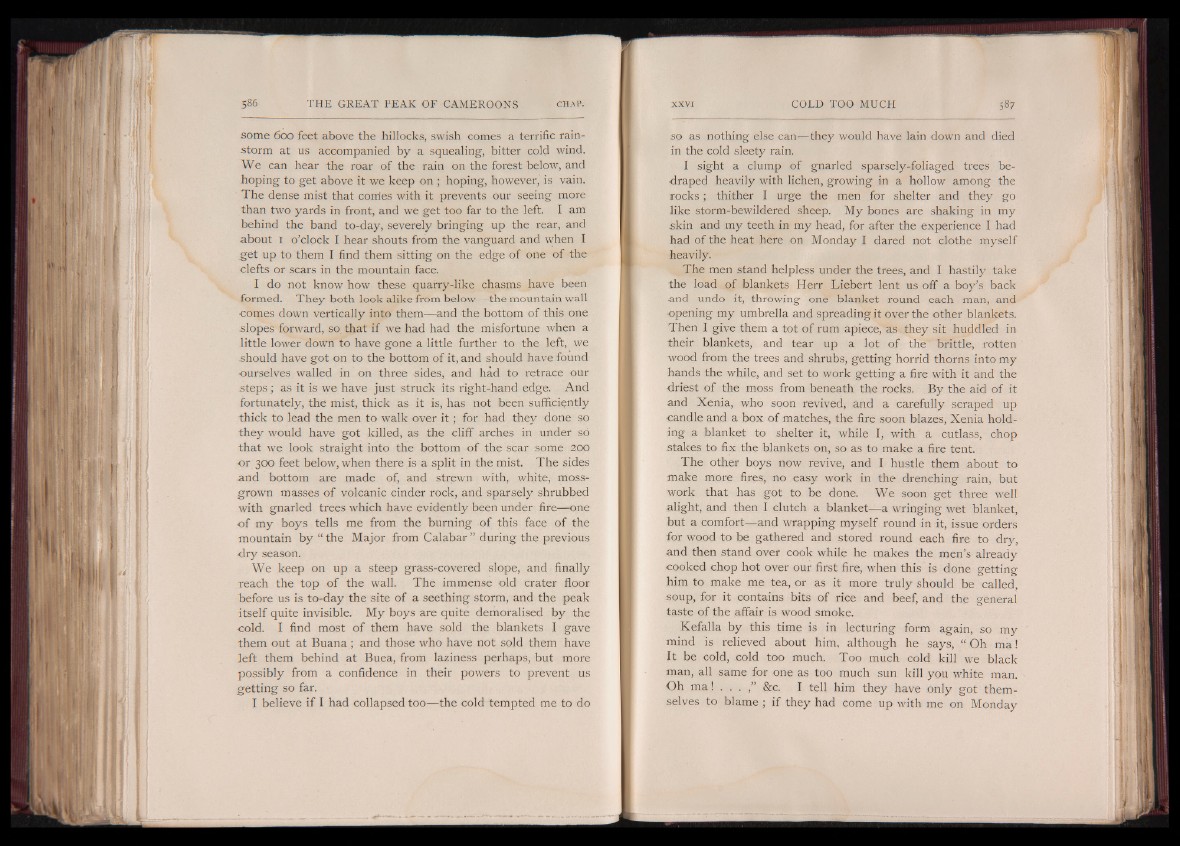
some 600 feet above the hillocks, swish comes a terrific rainstorm
at us accompanied by a squealing, bitter cold wind.
We can hear the roar of the rain on the forest below, and
hoping to get above it we keep on ; hoping, however, is vain.
The dense mist that corries with it prevents our seeing more
than two yards in front, and we get too far to the left. I am
behind the band to-day, severely bringing up the rear, and
about x o’clock I hear shouts from the vanguard and when I
get up to them I find them sitting on the edge of one of the
clefts or scars in the mountain face.
I do not know how these quarry-like chasms have been
formed. They both look alike from below— the mountain wall
comes down vertically into them— and the bottom of this one
slopes forward, so that if we had had the misfortune when a
little lower down to have gone a little further to the left, we
should have got on to the bottom of it, and should have found
■ourselves walled in on three sides, and had to retrace our
steps; as it is we have just struck its right-hand edge. And
fortunately, the mist, thick as it is, has not been sufficiently
thick to lead the men to walk over i t ; for had they done so
they would have got killed, as the cliff arches in under so
that we look straight into the bottom of the scar some 200
or 300 feet below, when there is a split in the mist. The sides
and bottom are made of, and strewn with, white, moss-
grown masses of volcanic cinder rock, and sparsely shrubbed
with gnarled trees which have evidently been under fire— one
o f my boys tells me from the burning of this face of the
mountain by “ the Major from Calabar ” during the previous
dry season.
We keep on up a steep grass-covered slope, and finally
reach the top of the wall. The immense old crater floor
before us is to-day the site of a seething storm, and the peak
itself quite invisible. My boys are quite demoralised by the
cold. I find most of them have sold the blankets I gave
them out at Buana ; and those who have not sold them have
left them behind at Buea, from laziness perhaps, but more
possibly from a confidence in their powers to prevent us
getting so far.
I believe if I had collapsed too— the cold tempted me to do
so as nothing else can— they would have lain down and died
in the cold sleety rain.
I sight a clump of gnarled sparsely-foliaged trees be-
draped heavily with lichen, growing in a hollow among the
rocks; thither I urge the men for shelter and they go
like storm-bewildered sheep. My bones are shaking in my
skin and my teeth in my head, for after the experience I had
had of the heat here on Monday I dared not clothe myself
heavily.
The men stand helpless under the trees, and I hastily take
the load of blankets Herr Liebert lent us off a boy’s back
.and undo it, throwing one blanket round each man, and
opening my umbrella and spreading it over the other blankets.
Then I give them a tot of rum apiece, as they sit huddled in
their blankets, and tear up a lot of the brittle, rotten
wood from the trees and shrubs, getting horrid thorns into my
hands the while, and set to work getting a fire with it and the
driest of the moss from beneath the rocks. By the aid of it
and Xenia, who soon revived, and a carefully scraped up
candle and a box of matches, the fire soon blazes, Xenia holding
a blanket to shelter it, while I, with a cutlass, chop
stakes to fix the blankets on, so as to make a fire tent.
The other boys now revive, and I hustle them about to
make more fires, no easy work in the drenching rain, but
work that has got to be done. We soon get three well
alight, and then I clutch a blanket— a wringing wet blanket,
but a comfort— and wrapping myself round in it, issue orders
for wood to be gathered and stored round each fire to dry,
and then stand over cook while he makes the men’s already
cooked chop hot over our first fire, when this is done getting
him to make me tea, or as it more truly should be called,
soup, for it contains bits of rice and beef, and the general
taste of the affair is wood smoke.
Kefalla by this time is in lecturing form again, so my
mind is relieved about him, although he says, “ Oh m a !
It be cold, cold too much. Too much cold kill we black
man, all same for one as too much sun kill you white man.
Oh ma ! . . . , ” &c. I tell him they have only got themselves
to blame ; if they had come up with me on Monday